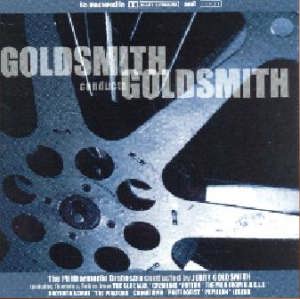************************************************************** EDITOR’s CHOICE February 2002 **************************************************************
Compilation:
Goldsmith conducts Goldsmith Includes themes and suites from: The Blue Max; Gremlins; Patton; The Man from U.N.C.L.E. Doctor Kildare; The Waltons; Chinatown; Poltergeist; Legend and Papillon
Philharmonia Orchestra conducted by the composer
SILVA SCREEN FILMCD336 [71:06]

This celebrated compilation, recorded in 1987, marked Jerry Goldsmith’s first concert (at London’s Barbican Centre) of his own film music. It is now reissued remastered in Silva’s HDCD process and in Surround Sound. It sounds positively stunning and the Philharmonia are inspired in this music - taken from some of his most famous and best-loved scores. This generous compilation is expanded from the original release to include a bonus track of music (‘Faerie Dance’ and ‘Re-united’) from Goldsmith’s magical quicksilver score for Legend played by the National Philharmonic Orchestra also in top form.
The music embraces many styles beginning in Late Romantic classical style with the thrillingly evocative aerial heroics of The Blue Max. A clutch of nostalgic TV scores follows: The Man from U.N.C.L.E. in an exhilarating upbeat jazz arrangement, then comes the arresting, noble Doctor Kildare theme, the exotic ‘jungle-like’ Room 222 melody, the warm homely Waltons rustic waltz and the more upbeat Barnaby Jones themes. The music for the mini series Masada is a welcome addition with its memorable Hebraic rhythms contrasted with its wistful secondary theme.
Placid middle-America evocations are followed by a devil’s kitchen-like scherzo for pizzicato strings and strident woodwinds in the Gremlins (1984) score.
A melody of contrasting film themes begins with the powerful and oriental music for The Sand Pebbles (1966) that also includes one of the loveliest wistful romantic melodies that Goldsmith ever penned. Chinatown’s (1974) bleak fragile melody with its disconsolate solo trumpet is followed by the tender love music for A Patch of Blue (1965) tender lullaby-like main theme with its haunting violin solo in dialogue with piano arpeggios, and surging strings. Poltergeist (1982) is represented by another comfortable, homely middle-American theme while Papillon (1973) has the dark frenzied waltz that reminds the Devil’s Island’s prisoners of better times. The suite ends in rip-roaring fashion with one of Goldsmith’s most majestic scores The Wind and the Lion (1975) full of the heat and passion of the Moroccan desert with exciting percussion rhythms and horn melody.
Stirring, strongly rhythmic marches come next: the swaggering MacArthur (1977) March and the very distinctive echoing trumpet motif that distinguishes the proud Patton (1970) March. The Lionheart music that follows is in the same mould – another gutsy march this time for the 1987Medieval tale set during the crusades. All starkly contrast with the gossamer light sparkling textures of the fairy music for Legend (1985) that brings this marvellous compilation to an end.
An excellent well-balanced compilation played the Philharmonia in top form. Don’t hesitate buy it. This compilation will definitely figure in my 2002 list of recommendations.
Ian Lace

Paul Tonks adds a note of warning:-
WARNING: This album has been released before. The only lure to make you want it again is a "Bonus Track" from Legend.
WARNING: If you’ve ever seen or heard Goldsmith in concert, you know this track listing already. The only thing missing is his tired anecdotes in between.
WARNING: As concert suites you can expect tempo, sequence, and orchestration to be wildly different from the original incarnations.
That said, you can’t fault the pieces themselves. Goldsmith’s scores to The Blue Max and Masada deserve the suites they’re given. In many ways the "TV Themes Medley" is a worthy presentation of: The Man from U.N.C.L.E., Dr. Kildare, Room 222, The Waltons and Barnaby Jones. The cobbling together in his "Motion Picture Themes Medley" is a less successful amalgam of material. The Sand Pebbles, Chinatown, A Patch of Blue, Poltergeist, Papillon, and The Wind and the Lion all hail from drastically different genres. Individually they’re wonderful. Together they’re somewhat lost amongst one another.
FINAL WARNING: All these quality works from the Sixties to the Eighties are only going to highlight what a load of tosh he’s been churning out since.
Paul Tonks

Return to Index